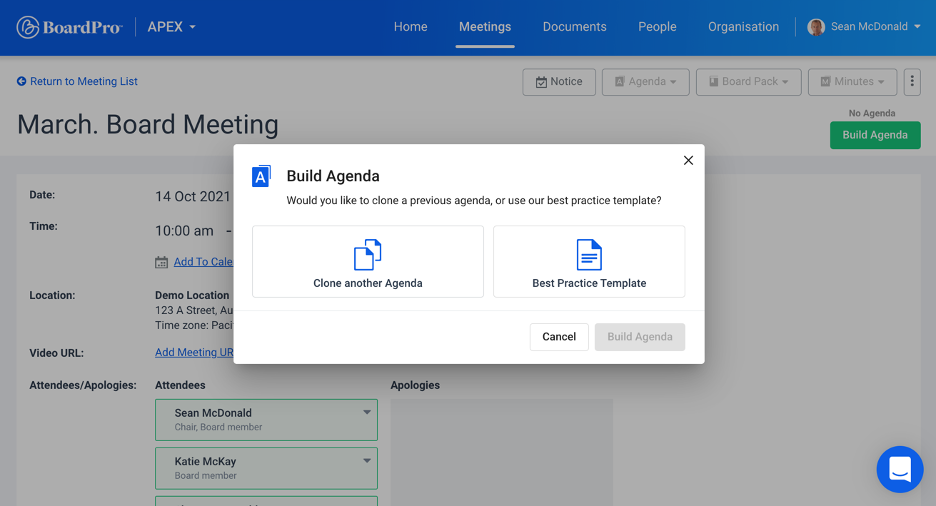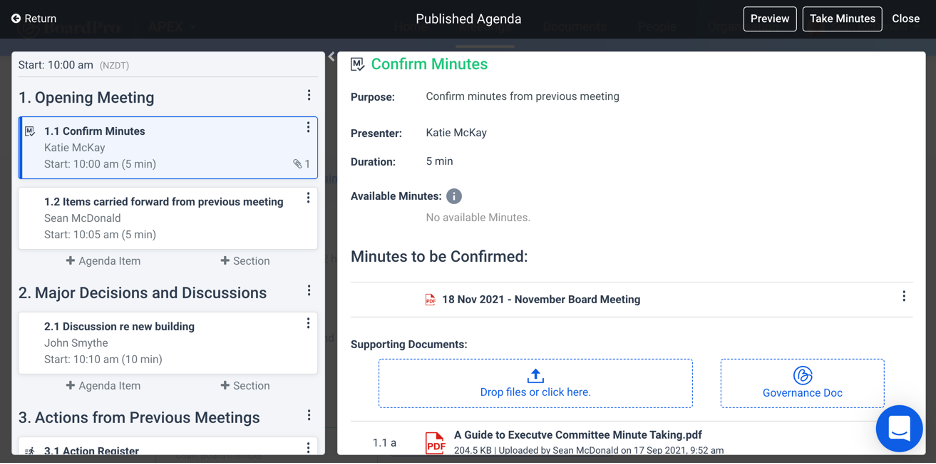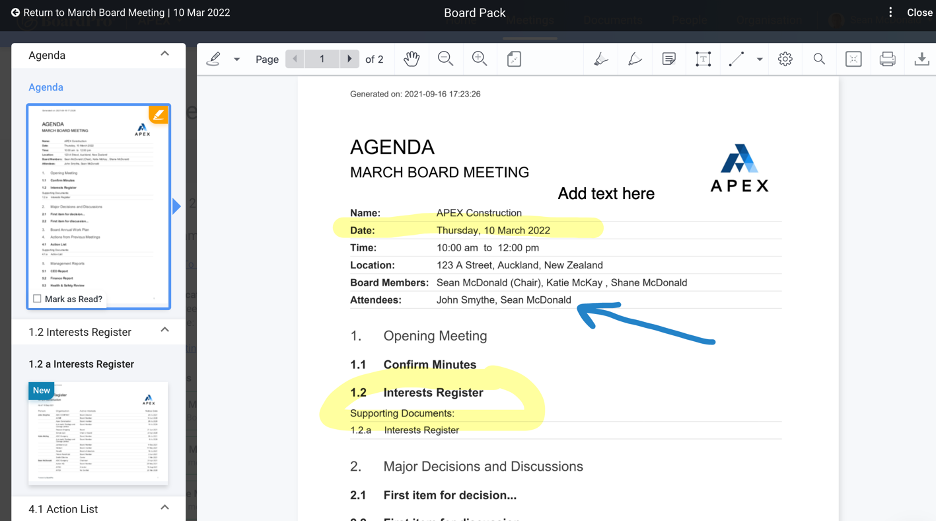Unlock the Power of Clear Board Meeting Agendas
A poorly run Board meeting is one of the fastest ways to lose sight of what you're trying to achieve, leaves board members disinterested and it wastes their time.
Considering they are some of the most valuable members of the organisation, the last thing you want to do is waste their time. The only sure-fire way to prevent that is to create agendas that are dynamic, clear and effective.
Tips for creating an effective board meeting agenda
Crafting a clear and effective agenda requires following a few simple steps but the result is a board meeting set up for success by making them engaging, productive and collaborative
Here are some of the best tips for building a board meeting agenda that will promote communication and organisation, no matter the size of the group:
1. Get organised
When you organise your board meeting agenda logically, your board meetings will become a lot more engaging. Think of it as the map board members need to follow and the driving force of the meeting. It will help everyone to move from one topic to the next and address all the items in an effective way so you don’t waste time on issues that are better suited for committee meetings.
If you want every topic of the board meeting to be covered effectively, your board meeting agenda needs to be organised clearly. Here’s how you can do that:
Identify the end goal of each topic. What does the topic need to do? Does it need to inform, find information, or arrive at a decision? This is important to know beforehand because each item in your agenda needs to have a clear goal. That will make it easier and less time-consuming for board members to reach it. Plus, it eliminates the risk of ending up down a rabbit hole.
Have a purpose. To keep your board meeting agendas flowing and on track, make sure each agenda item has a clear purpose documented. Who will be presenting on the topic and how long will you allocate for the discussion? With BoardPro, this is very simple to achieve as each agenda item has a field for the purpose, presenter and time.
Don’t let board meetings become messy. Keeping your board meetings organised is a top priority because it will keep the conversation on track and focused on what matters most. If you allow your board meetings to become messy, they will become unproductive and people will mentally check out very quickly.
Allocate time for each meeting agenda topic. This way your board meeting participants know exactly the time available against each agenda item to help them keep the board meeting on track.
2. Include only necessary information
Your board meeting agenda shouldn’t be packed with reports or bloated information. It should include only the necessary information that your board members require to be effective. Avoid drowning them with unnecessary information and tasks because it will severely impact their ability to be productive. Here’s what you can do to keep your board members fresh and engaged:
- Limit board-pack length. Limiting your board-pack length to 20 pages for average board meetings and 50 - 75 pages for special board meetings is a good rule of thumb to follow. Otherwise, you risk overloading the agenda and distracting your board members from important topics.
- Reduce the time you spend on routine items. Doing this is key because it frees most of the meetings to discuss strategy and critical issues.
- Avoid stacking up reports on the agenda. Remember, your board members will mentally check out if they are bombarded with unnecessary detail. If you have two or more reports on the agenda, you need to cut that down. Board members do not want to hear fellow members or staff talking at them for an hour or more. They want to participate, so stacking up reports on the agenda is not the way to go.
Ultimately, keeping your board meeting agenda concise and to the point is how you show board members how much you value their energy and time, and they will respond positively to that.
3. Make substance your main focus
An effective board meeting agenda depends on substantial content that will invite collaboration. You can have flawless formatting, but if your agenda items are not actionable, your board meeting won’t go anywhere. The way your agenda looks doesn’t matter as much as its substance.
When you’re creating a board meeting agenda, your main concern is planning it well and focusing on substance. First, choose the topics for the board meeting that are relevant for multiple board members. If the topics are relevant to everyone in the room, the meeting will be much more meaningful and stimulating. If you struggle to find topics that are relevant to at least half of the members, there could be a bigger issue.
4. Ask your board members for input
Asking your board members for input is a great way to improve your board meeting agendas and make them as effective as possible. Not to mention, asking for input is a great way to spark enthusiasm and make sure you don’t skimp on anything important.
To get your board members’ input, give everyone a chance at the beginning of the meeting to see if they have anything they’d like to discuss. Then, once you discuss agenda items, check in with them at the beginning and the end of the discussion to see if they want to add anything.
When members don’t have anything to add, that in itself provides input and can tell you a lot. For one, it indicates that the topic of discussion has been effectively covered and they are ready to move onto the next topic.
However, pay close attention. If you notice that your board members are always ready to move on, it could mean that the agenda is too long and they are not providing feedback so the meeting moves along faster.
5. Share the agenda beforehand
Once your agenda is ready to go, send it to every board member well ahead of time so everyone can check everything that has been included and prepare accordingly for the meeting.
By allowing your board members to prepare ahead of time, they will be better equipped to actively contribute, making the board meeting much more productive and effective. It will also provide details about the topics to be discussed and inspire them to ask questions for more engaging communication and collaboration.
When your board meeting agenda comes with reports and other documents, it’s important to give board members enough time to review them and discuss whatever they need in the meeting. It also allows them to focus on strategic issues, which is key for the organisation’s future.
Providing the board member agenda in advance will allow them to relax because it tells them that everything is accounted for and all the pressing issues will be discussed. This will reduce the number of interruptions they make during the meeting because they will already know what topics will be discussed.
How board management software can help with agendas
It takes a lot to prepare for a board meeting because there are many different tasks involved, which means it’s time-consuming, to say the least.
That’s where board meeting agenda ‘builders’ can help do some of the heavy lifting. BoardPro allows you to centralise all your board communications and information so everything is conveniently in one place for easy access.
When you have powerful board management software like BoardPro, you can create successful board meeting agendas and it doesn’t have to be time-consuming or stressful. The BoardPro Agenda Builder will make your work a lot easier, by allowing you to:
- Design dynamic board meeting agendas
- Clone board meeting agendas from a previous board meeting
- Share interactive PDFs of board meeting agendas with everyone on the board
- Take minutes following the same agenda structure and flow
- Give board members access to review the board meeting agenda and even add annotations
I just created an agenda and board pack for our next Board Meeting in 15 minutes... Simply Outstanding BoardPro
Jason Neely
Managing Director – Moa Holdings Ltd
How to use BoardPro Agenda Builder
There’s a short video here which shows you how to use BoardPro’s Agenda builder.Once you create a board meeting, you can start building your agenda with BoardPro’s Agenda Builder. You can also use the best practice template or clone a past board meeting agenda that worked well for you.

Then, you can start adding items and give each of them a purpose, assign them to board members, determine a time duration for them, and even attach any necessary documents.

Once you’re done creating your agenda, you can save it and make final updates before you share the secure meeting link with everyone who needs it.
How to make annotations during a board meeting
BoardPro also allows board members to make annotations to the agenda as the meeting progresses. With BoardPro Notes, everyone present in the meeting will be able to do this on their board pack. Only the user who makes the annotations can see them and they can be eliminated with one click.

Final words
If there’s anything that can make a difference between productive and unproductive meetings, it’s the board meeting agenda. That’s why it’s so important to use powerful tools and apply the best possible practices to create effective agendas that will serve the purposes of the organisation. BoardPro’s Agenda Builder is the tool which helps streamline meetings and improve the efficiency of setting everyone up for a productive session.
Share this
You May Also Like
These Related Stories

How to create a strategic board meeting agenda

The role of consent agendas in board meetings


